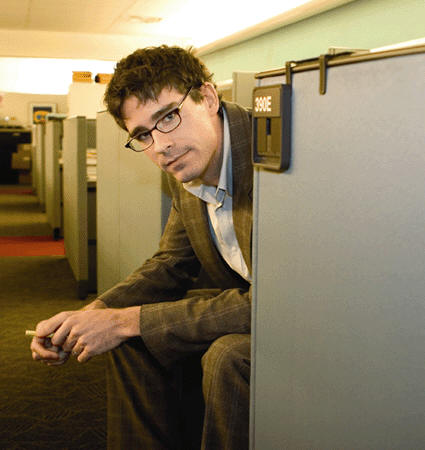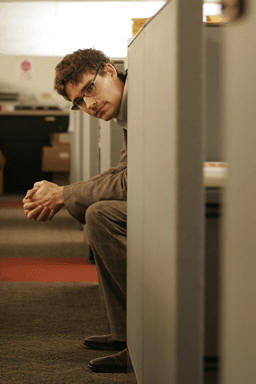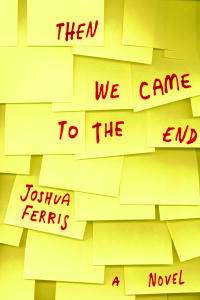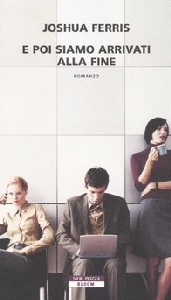Copyright ©2007 PopEntertainment.com. All rights reserved.
Posted:
May 17, 2007.
The problem with anything set in an office is just that – is it truly set in
an office? The correct tone is more often than not never struck, and the
corporate atmosphere almost always feels exaggerated and artificial, as if
written by a detached dilettante who had visited just once, to observe Take
Your Writer to Work Day.
As well, the party-line message almost always seems to be that office work
is a soul-deadening trap that depersonalizes and rubs well-meaning souls the
wrong way. Against the delicate fibers of human nature do these pitiful
office drones brush, all the while losing brain cells, personality and
abandoning all hope. We’ve seen it all before – from the Man In the Gray
Flannel Suit to The Office and Office Space – we laugh
because we know it’s true. But is it entirely true? As every company in the
world boasts of its “commitment to excellence,” how committed are their
employees?
There are other truisms that are often not explored. For most cubicle
dwellers, the billed hours taken to appreciate what may actually be had and
enjoyed is precious and few: the sense of community, of camaraderie among
co-workers, the free donuts and coffee, the deeply discounted medical
bennies, and the feeling (sometimes reluctantly) of the staff being – to use
the term without retching – a family.
Sometimes, you don’t know what you have until it’s gone. Novelist Joshua
Ferris does not suffer from this. A veteran of an advertising agency that
took a beating after the dot-com bust earlier this century, he has written a
fictional account of his office-life afterthoughts with his well-received
novel, Then We Came to the End (Little, Brown and Company).
Sure, the job is a grind, and when that is compounded by the threat of the
axe, it doesn’t tickle. However, this perversely strange yet ordinary way of
life is captured brilliantly and even optimistically in Ferris’ cast of
colleagues, everyone from the workaholic to the stoic to the hapless. Check
your organizational chart: they’re all here, but they’re not just types --
they live and breathe.
The “we” that Ferris uses (third person plural) at first seems as forced as
the corporations who use it in their advertising and annual reports – but
that unified “we” breaks down as the novel triumphantly travels on, and as
the heads begin to roll and as the circle becomes smaller and wound tighter
with tension.
A
native of Illinois who grew up in Key West, Florida, Ferris now writes full
time and lives with his wife in Brooklyn, but his COBRA plan of an office
experience has continued to dispense benefits.
 How did you come to
write the book?
How did you come to
write the book?
I
worked in advertising. I had a roommate in college whose father owned an
adverting agency. I was in debt and needed a job. They were kind enough to
take me in so that I could briefly learn the gloss of the advertising
industry.
At the first copywriting job I had, I was writing business-to-business
advertising. You had to learn the ins and outs of specific industries, like
livestock nutritional additives and synthetic fibers that interacted with
the environment. I learned a lot about the intersection between marketing
and manufacturing. Sales and delivery. The larger picture in the way in
which advertising, industry and communications intersected. I found it
terribly fascinating.
At the human level, it was fascinating too. A complex of people and
everything that goes into a large corporate environment I found strange and
fascinating. It seemed to me that, at this particular juncture, there hadn’t
been a lot of novels to address these particulars: work, why we work, why
work sucks, why work is good, why we love the work, why we overwork, why
work is meaningful in our lives, how it’s deadening. All sorts of things. I
thought that it was good literary fodder. There have been novels that had
addressed work and office life in a very satisfying way, like Something
Happened by Joseph Heller and Americana by Don DeLillo. But
nothing recent that really took work as its subject matter in anything more
than in a sitcomish way:
Give us a brief
synopsis of the story.
Everybody is getting laid off, so one by one they are under the axe. You
meet a cast of characters from Benny, the raconteur of the group) to Karen
Woo, who is the scourge, to Lynn Mason, the inscrutable, cool boss lady, who
may or may not be suffering from breast cancer. You meet these characters,
all of whom are suffering in some way from an ailing agency that had
resulted from the dot-com fizzle.
 It was set in the summer of 2001, and they are all paranoid and anxious. It
was important for me to set the book in that time period in order for me to
give the characters a more even-handed notion of what it meant to have a
job, with the threat of termination looming over them.
It was set in the summer of 2001, and they are all paranoid and anxious. It
was important for me to set the book in that time period in order for me to
give the characters a more even-handed notion of what it meant to have a
job, with the threat of termination looming over them.
They weren’t free to simply bitch and moan about the perks that they enjoyed
throughout the nineties. They were now able to contrast the time of drought
to a time of plenty. The comparison and contrast between the two allowed me
to present working -- the real luxury of having a job -- as something that
was deadening and at the same time that was potentially meaningful.
In every office, there seems to be a strange combination of misery and
mirth.
In offices, there are always really funny people around. In advertising,
especially – the people who come up with the funny lines. Every meeting is
prefaced with five minutes of sometimes-juvenile and sometimes-sophisticated
humor. That was the mirth part.
If nothing of great meaning can be derived from long, extended bouts in the
office, there is a certain palliative in the people that you come to know
and the personalities that offer relief and humor and compassion. Nobody
comes out of a job for any length of time without a friend or two. I know
that I have still have friends from the time that I worked.
What the book tries to show is that there is a community under siege, and
that despite their rather dysfunctional nature, they still lean on one
another to bring them meaning and relief.
As a writer with ambitions, did you ever see yourself as different from the
people surrounding you in an office? Did you take notice of the office
workers who resolved themselves to this lifestyle?
I
wouldn’t put it that way because I never saw myself in the context of those
who were stuck and those who were not. It would be hard for me to think any
other way than “what way can this particular event be translated into
something fictional?”
I
was interested in those in the office who were happy to be there, who found
a great deal of satisfaction – or at least sufficient satisfaction – in the
work product and their salaries and their perks.
If I ever felt there were camps, there were three. There were those who were
resigned to the job and were bitter about it; there were those who were
maybe like me who would use what I was experiencing as material for fiction;
and then there was a third camp who found satisfaction – to the great
bewilderment of the first camp.
If you had to go back
to work in an office tomorrow, would you?
I
doubt that I would. However, I think there are real merits to working in an
office. It’s hard to recognize that because the job is taken for granted.
Jobs are taken for granted the same way spouses are taken for granted, and
cars and cheap flights to Vegas. All of these things can be easily
overlooked when you’re in the thick of it.
 You had mentioned earlier that you had not enjoyed too much literature
addressing the reality of working in an office. Why do you think that is?
You had mentioned earlier that you had not enjoyed too much literature
addressing the reality of working in an office. Why do you think that is?
I
think the more interesting question is: to what extent are writers writing
fiction that is self-contained and to what extent are they writing fiction
that relies on social reality? The best depictions of the office are those
that are independent of their social context. The best things that I can
think of are the writings of Kafka, and the recent short stories by George
Saunders. This deploys all euphemisms and managerial hierarchies and fears
and concerns in the workplace, but uses them in a way that are inimitable
depictions that last through time regardless of specific industries.
I
don’t know, for instance, how well [NBC’s] The Office does because
I’ve never seen the show. The British version does it well because of the
characters. The boss is a unique character – not just in an office setting,
but in any medium, in any form.
What was the writing
experience like for you?
Well, it was a struggle for about a year and a half. I spent about sixteen
months writing it. Then I put it down and retired it. Then I took stock in
what I had and found it wanting. I took it to the shed and shot it.
I
realized that what I had done wrong was telling the story from the group’s
point of view. This is the pronoun that corporate America supports. It
doesn’t take long to find something with a “we” in it when you’re looking at
copy. The voice I had used up until that time was a little too cool and
corporate. There was already an inherent distance between the reader and the
narrator, because who the “we” is.
What I needed to do was infuse the voice as often as I could with a very
honest normative human quality. So the book starts out with “We were
fractious and overpaid.” The “we” is very corporate, but the qualities are
human. What I was interested in was the glossy lead presented in advertising
copy and the actual people who come in day after day and make that “we” up
and write that “we.”
How does it feel now
that the book is out of your head?
It feels very rewarding, humbling, stressful, fascinating. The stressful
part is adjusting to a loss of anonymity. When you are a writer writing
without concern -- without concern that the world is concerned -- there is a
different writer at play.
 When you start thinking about the way you are being perceived or the way
your writing is being perceived, I think that you have to have a robust
sense of purpose not to get derailed. And it’s not always possible.
When you start thinking about the way you are being perceived or the way
your writing is being perceived, I think that you have to have a robust
sense of purpose not to get derailed. And it’s not always possible.
There is a subtle elision from the book to the person once you’re a
published writer. Suddenly you’re talking not so much about the book; you’re
talking about the person. What emerges in the conversation -- what bubbles
up to the surface of the conversation -- is more about me and my experience
in advertising rather than me and my experience at my desk writing fiction.
I’ve spent more time at my desk writing fiction, looking completely
unproductive and doing what must seem to the space aliens hovering above me
as utterly fruitless work, than I did actually engaging in the advertising
industry.
I
can speak a lot longer about what it’s like to try to find your voice and
dedicating myself to the writing endeavor more than I can about working in
advertising. I’m not an advertising expert. I wasn’t a particularly good
copywriter.
Yet there will be plenty of cubicle-dwellers who will “get” your story.
Nabokov has a wonderful analogy about that: the reader and the writer are
walking up a mountain and they reach the summit at the mountain at the same
time, happily. There is very much a symbiotic relationship between a reader
and a writer. It’s a reader’s effort just as much as a writer’s. Zadie Smith
wrote in The Guardian recently that reading is just as hard as writing, and
I think that’s true. The quality of reading that lets a book work on the
reader as it should requires an active, intelligent, diligent reader.
Email
us Let us know what you
think.
Features
Return to the features page.

Copyright ©2007 PopEntertainment.com. All rights reserved.
Posted:
May 17, 2007.